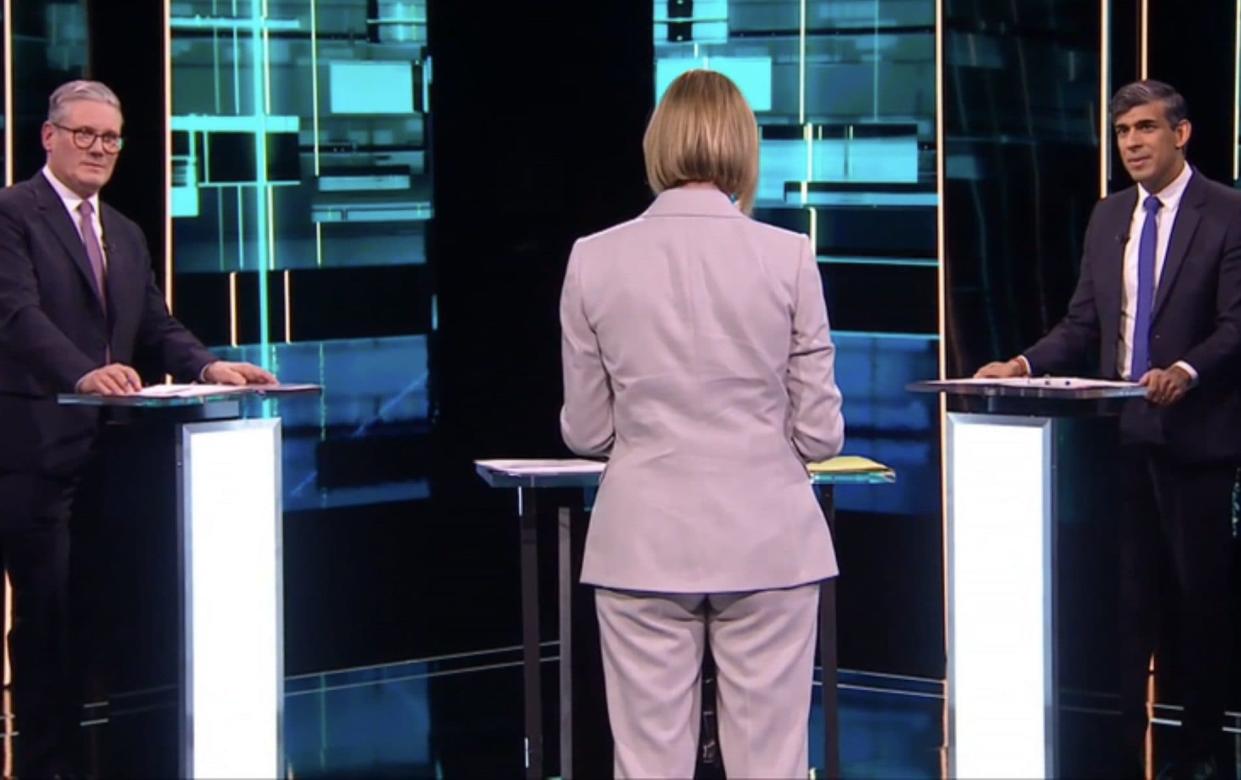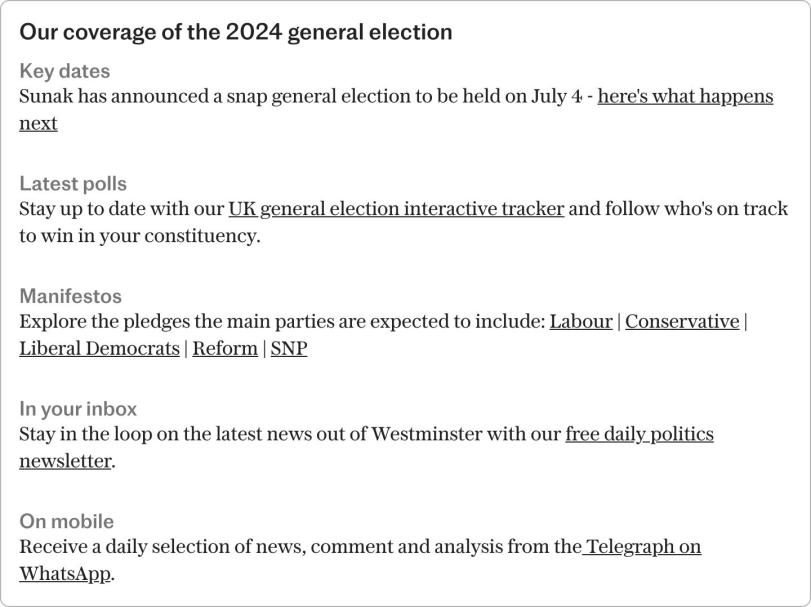Why the Tories’ claim that Labour will raise taxes by £2,000 adds up

The Tories’ claim that Labour will launch a £2,000 tax raid is backed up by Labour’s own figures and Treasury costings, analysis shows.
Rishi Sunak has denied he misled the public over the warning. Meanwhile, Britain’s statistics watchdog said the public had “no way of knowing” the truth about the prime minister’s claim and how it was produced.
However, the Office for Statistics Regulation (OSR) also said the Tories’ decision to involve Treasury civil servants in the calculation was a “long-standing practice” – and a deep dive into the numbers suggests the methodology behind them is sound.
The OSR also did not comment on the accuracy of the £2,000 figure which was partly calculated by Treasury officials, who were guided by Tory special advisers setting the assumptions.
But close examination shows that most of the maths underpinning this claim does indeed come from Treasury number crunching. Much of the rest comes from Labour’s own internal workings on what it expects its policies to cost.
In fact, Tory sources stress, only one policy was costed by the private sector – and that was in a note from an independent investment bank.
The regulator’s main criticism centered around the Tories’ decision to account for tax rise over several years, instead of the usual single year convention.
A more accurate figure would be a £500 a year increase in taxes, the OSR suggested. However, it did not criticise the Tories’ workings.
In a statement on Thursday, the OSR said: “Without reading the full Conservative Party costing document, someone hearing the claim would have no way of knowing that this is an estimate summed together over four years. We [have previously] warned against this practice.”
It also highlighted a letter sent to Labour by James Bowler, Treasury permanent secretary, who said Tory claims about the opposition’s tax and spending plans “should not be presented as having been produced by the civil service”.
Labour maintains that the claims are misleading. Sir Keir Starmer accused Mr Sunak of lying and breaking the ministerial code.
But the Tories have insisted that their costings are fair, adding that working households could in fact face an even higher tax rise if Labour follows through with “aspirations” such as increasing defence spending.
Mr Sunak told ITV that Labour were “rattled that we’ve exposed their plans to raise tax” as he denied he was “willing to lie in order to stay in power”. Both Labour and the Tories have used civil servants to cost opposition policies since the 1950s.
Analysis by the Institute for Government found that between January 2008 and January 2010, the Labour government asked the Treasury to undertake 38 costings of Conservative policies.
Sir Robert Chote, the head of the body that oversees UK statistics, said he would ban the practice altogether.
He said: “This was a bad precedent when it started and we’d be much better off without it because it confuses the picture. It puts the Treasury in a very difficult position because their officials are held responsible for numbers that are partly shaped by political advisers.”
Here is the working behind the sums:
Spending
The document in which the £2,000 tax raid claim was made was originally unveiled by Jeremy Hunt, the Chancellor, last month. It adds up the theoretical cost of previously announced Labour policies and subtracts the amount of revenue expected to be raised by other measures from Sir Keir, to get to a figure for additional tax rises needed to deliver on his party’s ambitions.
Mr Hunt’s document examines 19 Labour spending commitments, ranging from creating two million more GP appointments to the party’s net zero plan.
The Treasury costed all but three of them, although its analysis was based on assumptions provided by Tory special advisers, who do not abide by the same impartiality rules as civil servants.
For example, Labour’s plans to bring the delivery of some public services in-house is underpinned by a claim that outsourced services are 7.5pc more efficient than insourced ones.
This is taken from a report published by the Institute for Government, an independent think-tank, and this number specifically relates to cleaning services. The Treasury itself said last month it had “low confidence in this because the difference between the cost of outsourcing and in-house delivery is highly circumstance specific.”
The three policies that were not costed by the Treasury are big commitments.
The first is Labour’s Green Prosperity Plan, which will help drive Britain towards net zero. These numbers are taken from Labour’s plans to spend £4.7bn per year on going green after it was forced to row back on a £28bn-a-year pledge.
The second is linked to Labour’s pledge to offer a “fair pay agreement” to people working in adult social care, many of whom are paid the minimum wage of £11.44 an hour.
Labour has not set out what it believes is a fair wage, simply stating it will “consult widely” to “empower workers” with a new deal.
The Tories based their assumption that the policy will cost £2bn over the next four years – or around £110 per working household – on a written question submitted by Matt Warman, the Conservative MP for Boston and Skegness, who asked how much it will cost to increase pay for staff in the social care sector by 65p per hour to more than £12.
Helen Whatley, the social care minister, said her assumption of £600m per year only included “direct care staff” and also left out “additional costs” borne by more than 200,000 people who pay for their own care costs.
The Tories’ Ukraine funding estimate is based on Labour matching Mr Sunak’s pledge to pump £500m of new military aid into Ukraine and claiming it will do so every year until the end of the decade.
This was after David Lammy and John Healey, the respective shadow foreign and defence secretaries, vowed there would be “no change in our military, diplomatic, financial and political support to Ukraine”.
Revenue
Hunt presented eight Labour tax rises in his dossier, of which five were costed by the Treasury, including VAT on private schools.
Adding VAT at 20pc to school fees raises an estimated £1bn per year, with business rates adding another £120m.
However, there is significant uncertainty around these numbers. Depending on how many pupils join the state school system, the VAT raid may raise £700 million and not £1 billion, for instance.
Labour and the Tories also differ on the amount of extra money a windfall tax on energy companies will bring into the Treasury.
Labour claims the amount could be as high as £10.8bn over five years. The Tory analysis is based on a note by investment bank Stifel, which suggests the number will be closer to £6.5bn, and does not include job losses.
The windfall tax on oil and gas firms has already been extended by 12 months by Mr Hunt, with a 35pc surcharge on profits now ending in 2029.
A crackdown on a tax break enjoyed by private equity firms is also estimated by the Treasury to cost the exchequer money instead of raising anything, because of an assumption that wealthy people will move out of the country as a result.
Labour itself appears to recognise this, with some Labour politicians putting pressure on Ms Reeves to bring its raid closer to the levies imposed in similar European countries to prevent an exodus.
The Tories also took Labour’s claim that it would raise more than £10bn over five years from crackdown on tax dodging and non-compliance at face value.
In practice, squeezing extra tax from avoidance and evasion has been difficult in the past, though some tax experts said making tax digital will ensure higher revenues from the self-employed.
The £2,000 figure
Taken together, these assumptions mean the Tories estimate that Labour expects to spend £3,380 per working household on new measures.
A total of £2,111 of this is based on Treasury estimates and the remaining £1,269 is from Labour or costings by other government departments.
Labour is expected to raise £1,286 from its revenue plans. Of this, £368 is based on Treasury costings and the rest are from Labour, other departments and Stifel.
The difference between the revenue-raising and spending measures is £2,094. This amount of money is what the Tories say must be raised by additional tax raids. Of this number, £1,742 comes from Treasury analysis and only £351 from other sources.
Although the split suggests that the Conservatives are largely relying on Treasury numbers for their workings, economists still criticised the way the numbers were presented.
The standard practice is generally to cost policies on an annual basis rather than over a period of several years.
Ed Balls, the former shadow chancellor, admitted that Gordon Brown, the former chancellor, regularly deployed this “roll-up” tactic.
He told the Political Currency podcast: “Actually it’s £500 [per year] and they’ve then added it up over four years. So it’s £500 a year for four years, which is the kind of roll-up that you [George Osborne] liked to criticise Gordon Brown for in 1998.”
Stuart Adam, a senior economist at the Institute for Fiscal Studies, said: “People hearing the £2,000 number without being told what period it referred to could be forgiven for assuming it’s annual.
“That is the most common period such things are measured over – employees don’t normally think of their salary over a four-year period, for example.
“And there are reasons for sticking to annual figures. If you start adding them up over several years, the number of years you pick is arbitrary and the more years you include, the bigger the number sounds.
“Using annual figures consistently has the crucial advantage that they’re comparable.”


